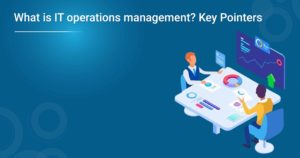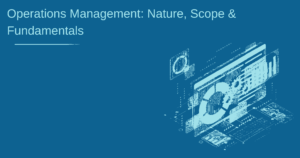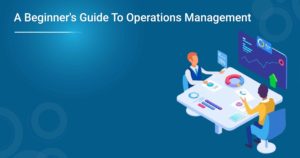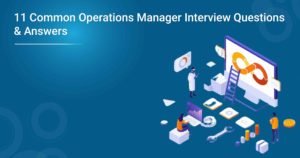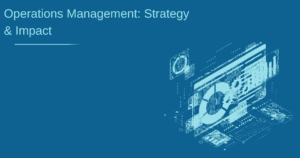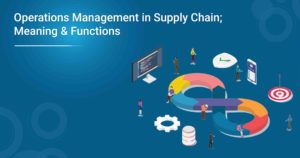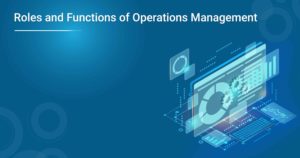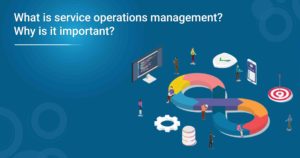Operations managers play a vital role in any organization. They are responsible for ensuring that operations run smoothly and efficiently. To start a career in operations management, you must be prepared for your job interview. This blog post will provide 11 common operations manager interview questions and answers. We will also give you tips on answering these operations manager interview questions effectively.
1. Why Have You Chosen To Become An Operations Manager?
Operations managers are responsible for the overall operation of a company. They oversee the production process and ensure that all departments work together efficiently. Operations managers often have a background in business administration or engineering. With this question, the employer wants to see whether you are mentally prepared for the opportunities and responsibilities that come with the job title.
How To Answer one of the operations manager interview questions: I have always been interested in how businesses operate, and I enjoy being able to solve problems and help improve efficiency. I chose to become an operations manager to help lead a company by ensuring it meets its objectives through my strategic and visionary skills.
2. What Are The Qualities of A Proficient Operations Manager?
It’s one of the straightforward operations manager interview questions which you can answer confidently. A proficient operations manager is a highly organized and detail-oriented individual who can effectively oversee a business’s day-to-day operations. They must have strong leadership skills and be able to motivate and inspire those around them to achieve common goals.
They must be excellent communicators and have the ability to think strategically to solve problems efficiently. A proficient operations manager will also have a keen understanding of financials and how to manage budgets effectively.
3. What Skills Will You Use To Resolve Business Operations Issues?
Operations managers ensure that business operations are running smoothly and efficiently. They will use various skills to resolve any issues that may arise, such as problem-solving, decision-making, people management, and project management.
Operations managers need to identify problems quickly and find practical solutions. They must be able to make decisions promptly and have the capability to juggle multiple projects simultaneously. Strong people skills are essential for operations managers, as they often deal with employees at all levels of the organization.
If you are applying for an operations manager position, be prepared to discuss your problem-solving, decision-making, and project management abilities. You should also be ready to give examples of how you have effectively managed people and projects in the past.
Also Read: What Is Capacity Planning In Operations Management?
4. How Will You Balance Between Meeting Your Goals And Managing A Team?
Assuming you are being asked this question about strategic balancing in work, you must keep a few things to keep in mind.
First and foremost, it’s essential to be clear about what the goals are. The team should know what needs to be accomplished and when. Secondly, based on the team’s size and the project’s complexity, create a plan that assigns tasks and deadlines accordingly. And lastly, effective communication is key to ensuring everyone is on the same page and walking towards the same goals.
If done correctly, balancing meeting goals and managing a team can be a seamless process. It’s important to remember that delegating doesn’t mean passing off all responsibility – as the operations manager, you will still need to check in periodically and offer support where needed. But by following these steps, you can successfully manage both your goals and your team.
5. What Will Be Your Strategy For Management To Fulfill Business Objectives?
As an operations manager, your primary responsibility will be to ensure that the company’s operations run smoothly and efficiently. You will need to devise and implement strategies for managing people, processes, and resources.
There are several different approaches that you can take to management, but your strategy must align with the company’s business objectives. For example, if the company’s goal is to increase sales, then your management strategy should focus on maximizing productivity and efficiency to meet customer demand.
In the end, it depends on you to decide what management style best suits the company and its objectives. However, no matter what approach you take, it is essential that you can effectively communicate your vision and goals to your team and works together to achieve common goals.
6. How Will You Measure the Success Of Your Team?
There’s no single answer to one of the operations manager interview questions – it will depend on your team’s specific goals and objectives and what success looks like concerning those. However, some common ways to measure success include productivity levels, quality of work, customer satisfaction levels, employee satisfaction levels, retention rates, and so on.
It’s essential to set clear and achievable goals for your team and to have a plan for measuring success against those goals. It will help you to identify areas where your team is excelling or falling short and enable you to make necessary changes to improve performance.
7. What Are The Key Challenges In The Operations Management Field?
There are a few key challenges that come with managing operations. The first challenge is forecasting future demand. It involves looking at past data and using it to predict what customers want or need in the future. This can be difficult because customer behaviour is often unpredictable.
Another challenge is ensuring that all parts of the operation run smoothly and efficiently. It includes everything from the manufacturing process to customer service. When one part of the operation is not running correctly, it can throw off the entire system.
Finally, another big challenge for those in operations management is keeping up with technology. New technologies can help improve efficiency and quality, but they can also be expensive and challenging to implement. Operations managers must stay on top of new advancements in their field to ensure that their company uses the best possible methods.
8. How Will You Manage An Underperforming Team In Your Supervision?
It’s inevitable that, at some point, you will have to manage an underperforming team. Keep these tips handy to deal with this situation:
- Talk to each team member individually to identify the problem and devise a plan to address it.
- Set clear expectations and goals for the team and hold them accountable.
- Create a positive and supportive environment where team members feel comfortable communicating openly.
- Offer feedback regularly, both positive and constructive.
- Be patient and consistent in your efforts to help the team improve.
9. How Will You Handle Failures In Your Tenure?
Operations managers are responsible for ensuring that businesses run smoothly and efficiently. They develop and implement plans to improve productivity and quality while reducing costs. A key part of an operations manager’s job is anticipating and preparing for problems that could disrupt business operations.
Operations managers must handle failures in their tenure effectively to keep the business running smoothly. There are a few steps that an effective operations manager can take when faced with failure:
- First, assess the situation and identify the root cause of the problem. It will help you develop a plan to prevent the problem from happening again.
- Next, develop a contingency plan to deal with the immediate consequences of the failure. This may include implementing measures to mitigate any customer impact or financial loss.
- Finally, implement steps to improve processes or procedures to prevent the failure from happening again in the future. It could involve changes to training programs, workflows, or other aspects of operations management.
Also Read: What Is The Scope Of Operations Management?
10. Which Data Processing Tool/Software Are You Good At?
There are various data processing tools and software available, and it is essential to know which ones you are good at using. It will show the interviewer you have the skills necessary to perform the job.
Some common data processing tools and software include Microsoft Excel, Access, and SQL. If you are good at using these programs, mention this to the interviewer. Other data processing tools include statistical analysis software, such as SAS and SPSS. If you are familiar with these programs, let the interviewer know.
In addition to mentioning which data processing tools and software you are good at, be sure to explain how you use them. For example, if you are good at using Excel, mention how you organize data or create charts and graphs. It will give the interviewer a better understanding of your skills.
11. Where Do You See Yourself In The Next 5 Years?
This is the most common concluding question of any interview, which is about knowing your calibre and how you have envisioned your career. You must answer this question. You must show that you are ambitious and have long-term goals. However, you should also be realistic and explain how your current skills and experience can help you achieve these goals. Answer in a strategic manner that will place you as a strong and visionary individual.
For example, if you want to be promoted to a senior management position, you should describe how your leadership and problem-solving abilities will contribute.
It is also essential to demonstrate that you are committed to the company and have no intention of leaving shortly. You can do this by highlighting your loyalty and dedication to your work.
How you can answer one of the operations manager interview questions: In the next coming years, I will be continuing to develop my skills as an operations manager. I want to continue to grow my knowledge in all areas of operations management so that I can be an even more effective leader for my team.
Additionally, I hope to continue building strong relationships with my team members and other departments within the company so we can work together even more efficiently. Finally, I want to contribute to the growth of the company by helping to streamline processes and improve overall operations.
Why is Operations Management a Thriving Field in India?
Operations management is a field that is constantly evolving, and there are many reasons why it is a thriving field in India. One reason is that the population of India is growing, which means an increasing demand for goods and services. Additionally, the Indian economy is booming, creating opportunities for businesses to expand their operations.
Furthermore, India has a large pool of talented and skilled workers. This makes it an attractive destination for companies planning to set up or expand their verticals. Additionally, the government of India has been supportive of the growth of the operations management industry, providing various incentives and benefits.
What Skills Are Required To Become an Operations Manager?
A company’s overall management and coordination come on the shoulder of operations. They develop and implement strategies to improve efficiency and productivity while ensuring that quality standards are met. To be a successful professional, an operations manager must have strong leadership, communication, problem-solving, and organizational skills. They must also work well under pressure and handle multiple tasks simultaneously.
Some of the Key Skillset Are:
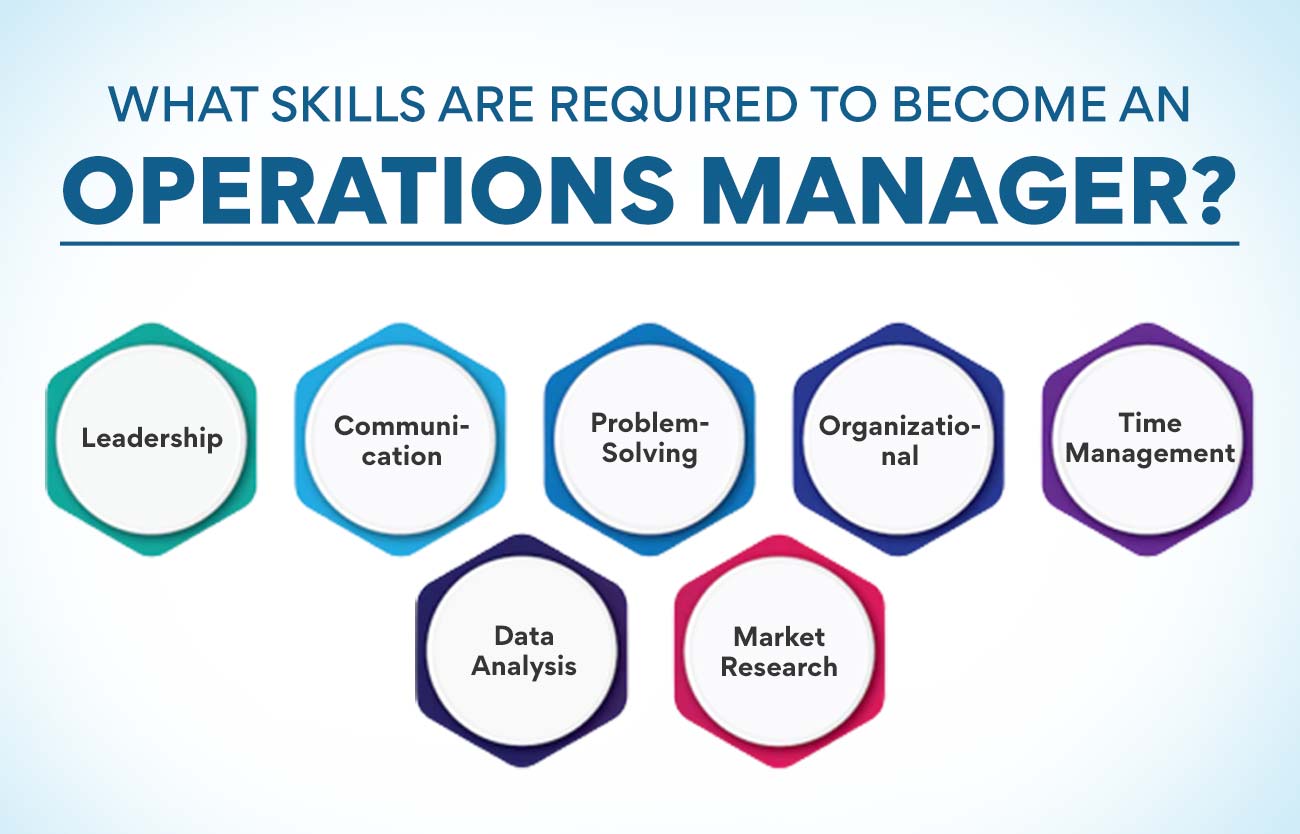
Leadership: An operations manager must have strong leadership skills to effectively manage and motivate employees. They should inspire others to achieve company goals.
Communication: An operations manager must communicate effectively with employees, department heads, and other stakeholders. They must be able to articulate company policies and objectives.
Problem-Solving: Must be able to identify problems and develop creative solutions. They must think outside the box and develop new ideas to improve efficiency.
Organizational: Must be highly organized to coordinate company operations effectively. They should create and implement schedules, plans, and budgets.
Time Management: Must manage their time efficiently to meet deadlines and achieve company goals. They should prioritize tasks and delegate work appropriately.
Data Analysis: Must be able to analyze data to make informed decisions. There should be a good understanding and interpretation of financial reports, performance metrics, and other data sets.
Market Research: Must be able to conduct market research to identify trends and opportunities. They should be able to research competitors and understand customer needs.
Conclusion
If you’re interviewing for an operations manager position, you must be prepared to answer some crucial operations management interview questions about your experience leading and managing teams. In addition, expect to field questions about your ability to handle conflict, solve problems and improve efficiency.
If you want to enter this challenging yet rewarding career with a hands-on experience with all the responsibilities of an operations manager, we have a course for you. Our Advanced Certificate in Operations, Supply Chain and Project Management will provide you with the knowledge and skills to thrive in operations management. Ace all your interviews with the domain expertise you can achieve with our course.
Sound tempting, right? Go check out our course right away!
More Information:
Operations Management in Hospitals – Know Crucial Functions
What is Order Management? A Comprehensive Guide








